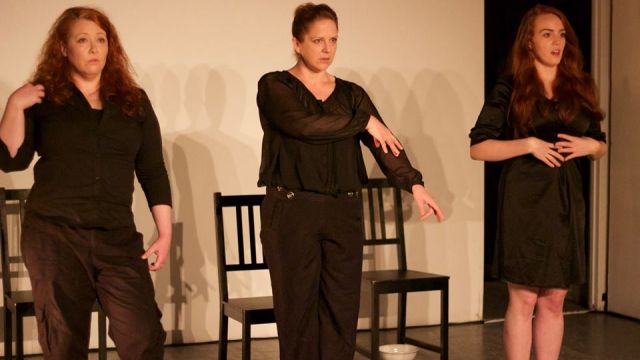The Medea Project
On a huge screen, across the whole upstage wall of the tiny Brunswick Arts Space, twenty women – wildly different in life experience, attitude, age, ethnicity, profession and appearance – answer questions about life, work, happiness, love and children. This is filmmaker Carol Cumming’s contribution to the piece. The women are (mostly) unself-conscious, engaging and ponder the questions seriously. The last question is the biggie – and the link, of course, to the 2446-year-old classical tragedy of Euripides’ Medea: could you kill your child? Some of the women say most definitely not; others are not so sure. Until you walk in another woman’s shoes…
The integration of contemporary women’s experience with the story of Medea is the point or substance (I won’t say intention) of this show. A program note tells us that the script is ‘drawn from… the original texts, memories, poems, song lyrics, newspaper articles and pieces written by the ensemble’. What then is the intention? I believe it is to recognise, feel for and give dignity to women’s experience – that is, the experiences they have as women.
On a stage bare except for three black chairs, three performers, all in black, weave in and out of the Medea text, interlacing their own found and original material. There is no attempt to present Medea as a ‘play’ per se; that is never the intention and the additional material would jar if it were. The three women barely interact; they do not look at each other; they address the audience with emotion charged eloquence. Their movements are stylised and highly expressive, complementing the text – especially when those movements emphasise their bodies and the violence that is done to them. When murders occur, the women scrape the wooden chairs on the concrete floor – a simple but brilliant and disturbing touch. A child’s death is signified by overturning a basket of toys so they scatter across the stage.

Sally McLean as the ‘Nurse’ – which also means a kind of choric narrator as well – carries and expounds the text in a mellifluous voice with great confidence, authority and a feel for the timing of the rhetoric. Hannah Gott plays the unfortunate trophy wife Cruesa, the callous opportunist Jason and King Creon. Here the concept rather fights against the text. The story continues to be told, but although this is by no means a naturalistic presentation, Ms Gott might distinguish each of her characters more clearly. Both Ms McLean and Ms Gott step out of character to add, in contrast or parallel, a pointed pop song lyric, newspaper headline or fragment of poetry.
Kristina Benton as Medea forcefully suggests the depths of bewildered pain of abandonment and exile, but not, somehow, the incandescent fury and the towering thirst for revenge that drive Medea to murder her children and Cruesa.
And therein lies the flaw in the concept of The Medea Project. Medea is not a contemporary woman. She is a character from antiquity, a time of different gods, a woman for whom, yes, we feel pity, but when she turns against her persecutors that pity is replaced by awe and terror as she transforms into a ruthless, pitiless killer. This production need not slavishly follow the original, but let’s remember that in the original Medea leaves the stage in triumph.
The attempt to elicit sympathy for this Medea and to place her among the disturbed, deluded and pitiable (real) women who killed their children, catalogued toward the end, doesn’t quite come off. It is always risky to take a piece of ‘classic’ literature and bring it into the present in an attempt to illuminate the present or to shed new light on the piece itself. The result, so often, is to diminish the original, to ‘domesticate’ it, as it were.
Here, with all respect to imaginative director Perri Cummings’ impeccable intentions and the often beautiful, disciplined performances, the emotions Ms Cummings wants us to feel are somewhat weakened by attempting to mesh two experiences, two times and two contexts together.
Michael Brindley
Subscribe to our E-Newsletter, buy our latest print edition or find a Performing Arts book at Book Nook.

